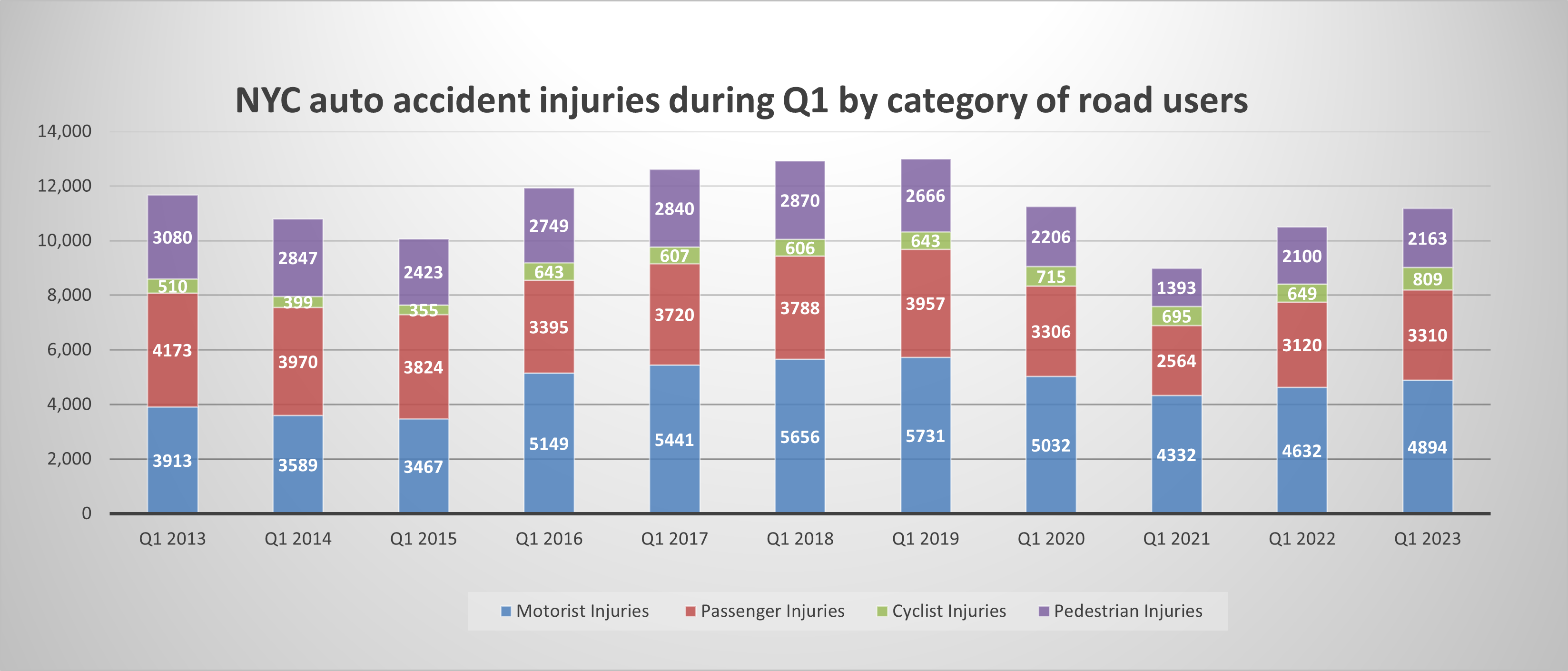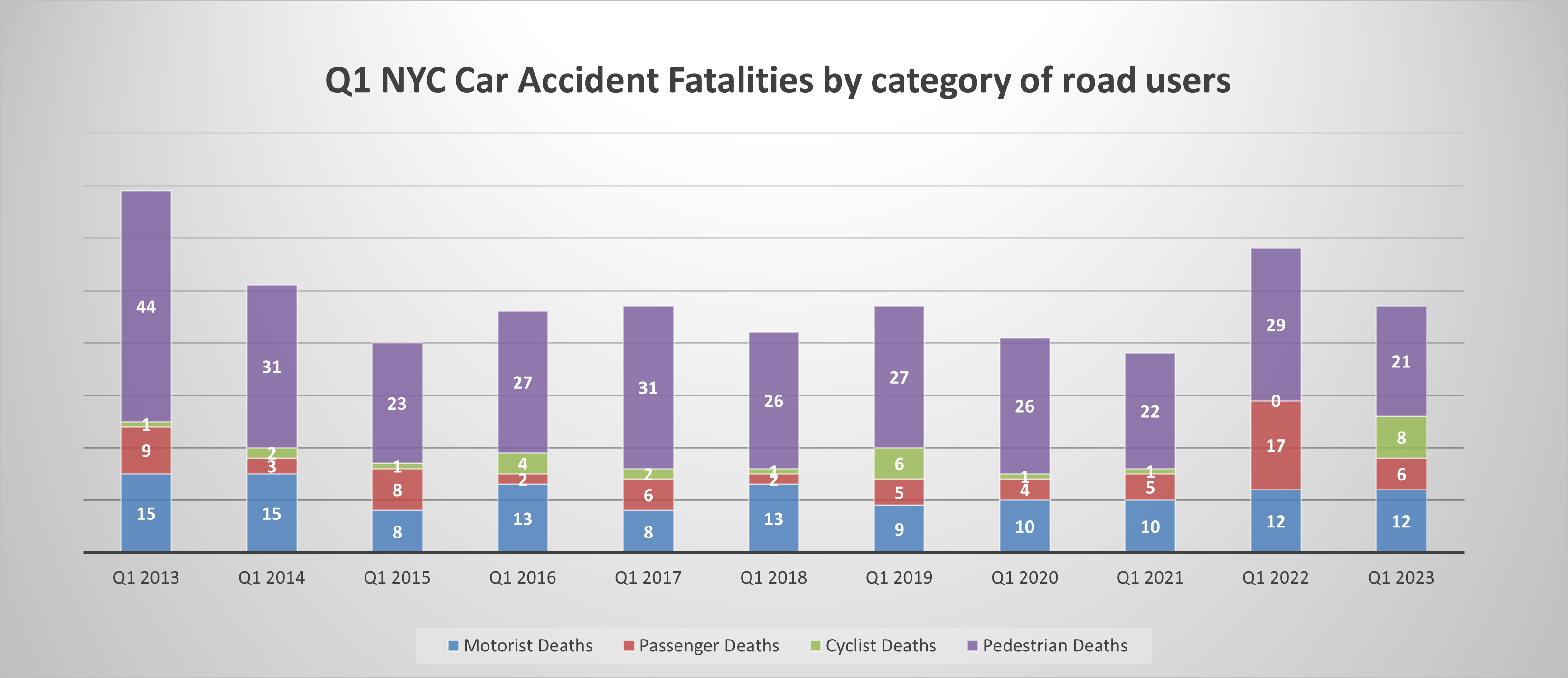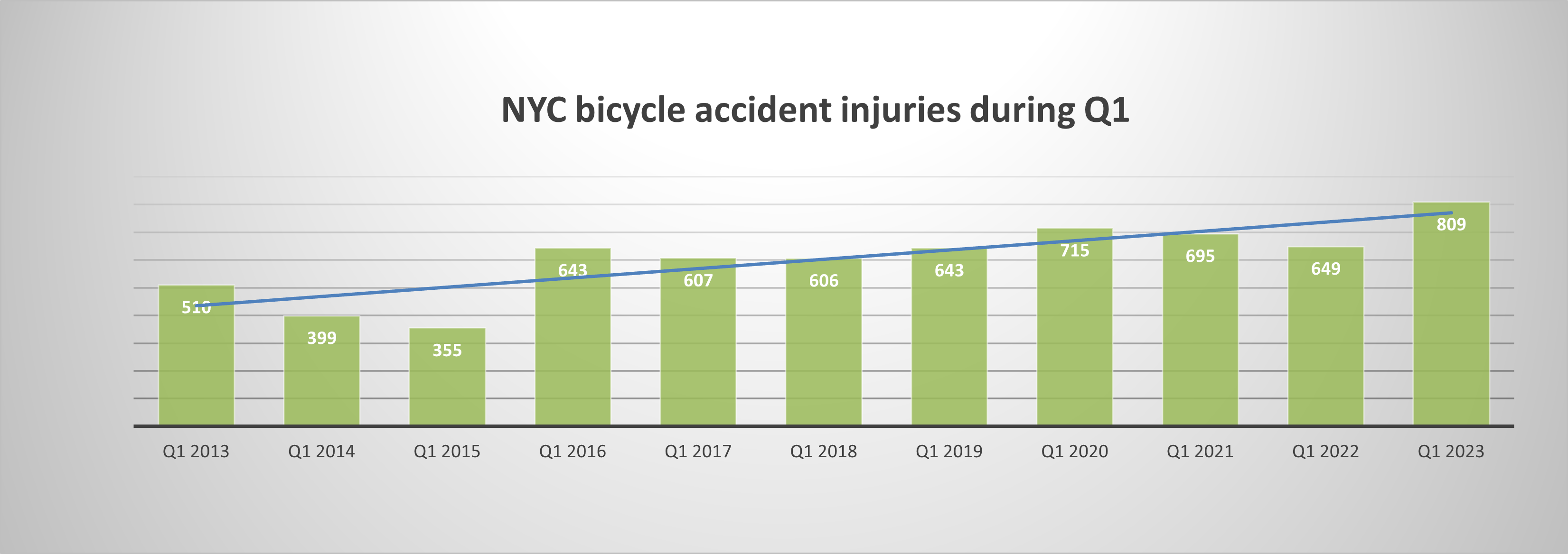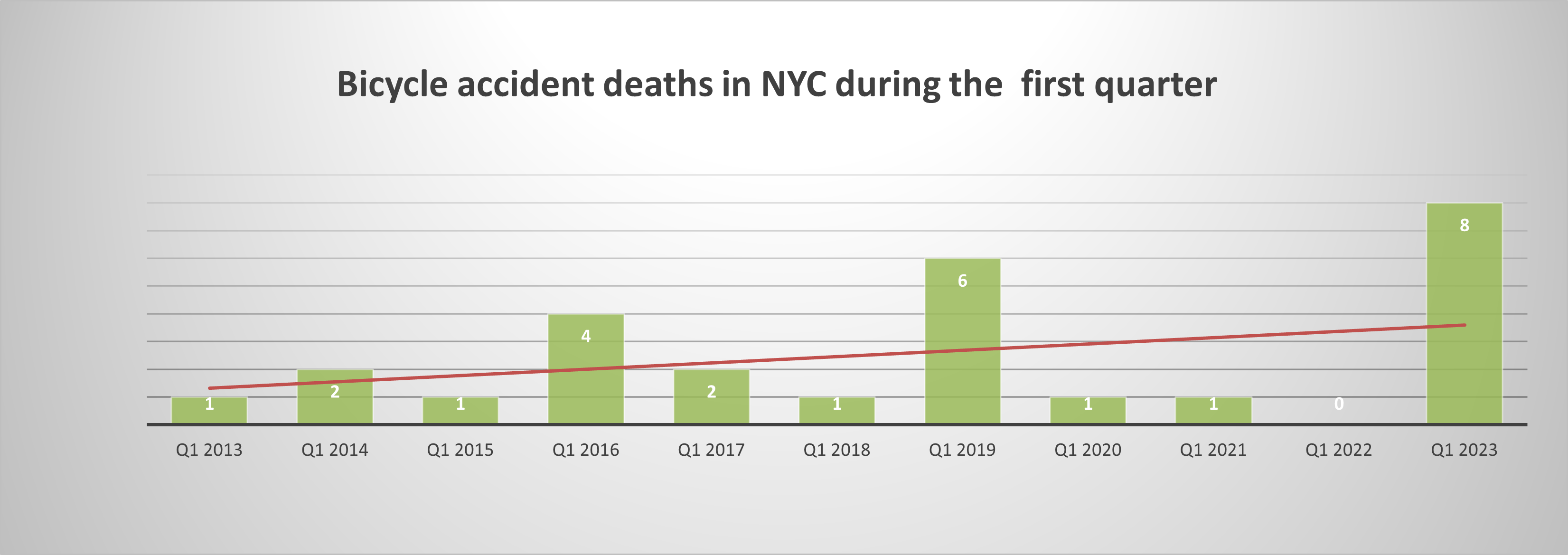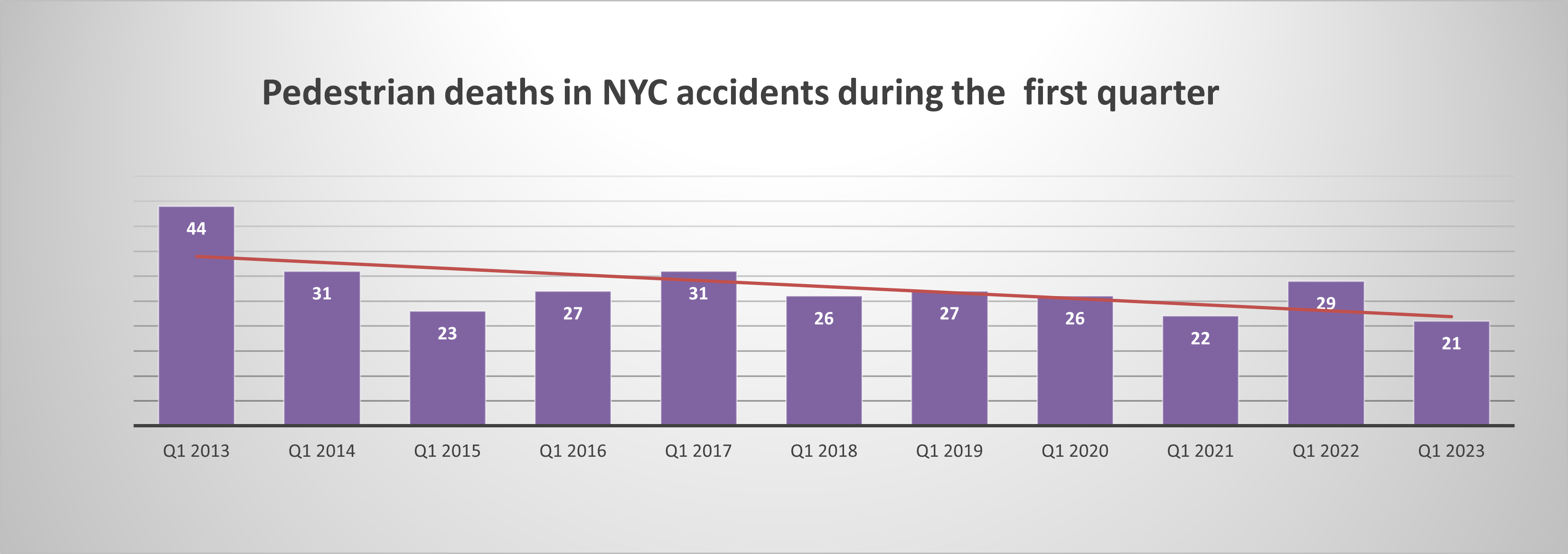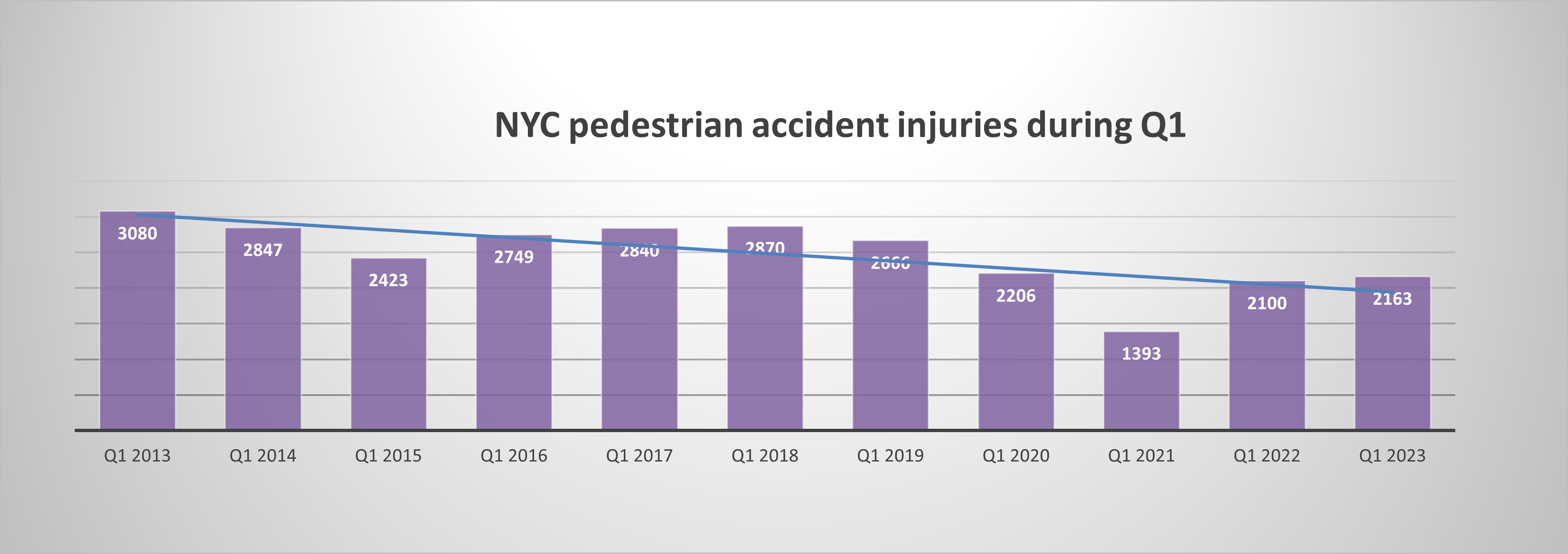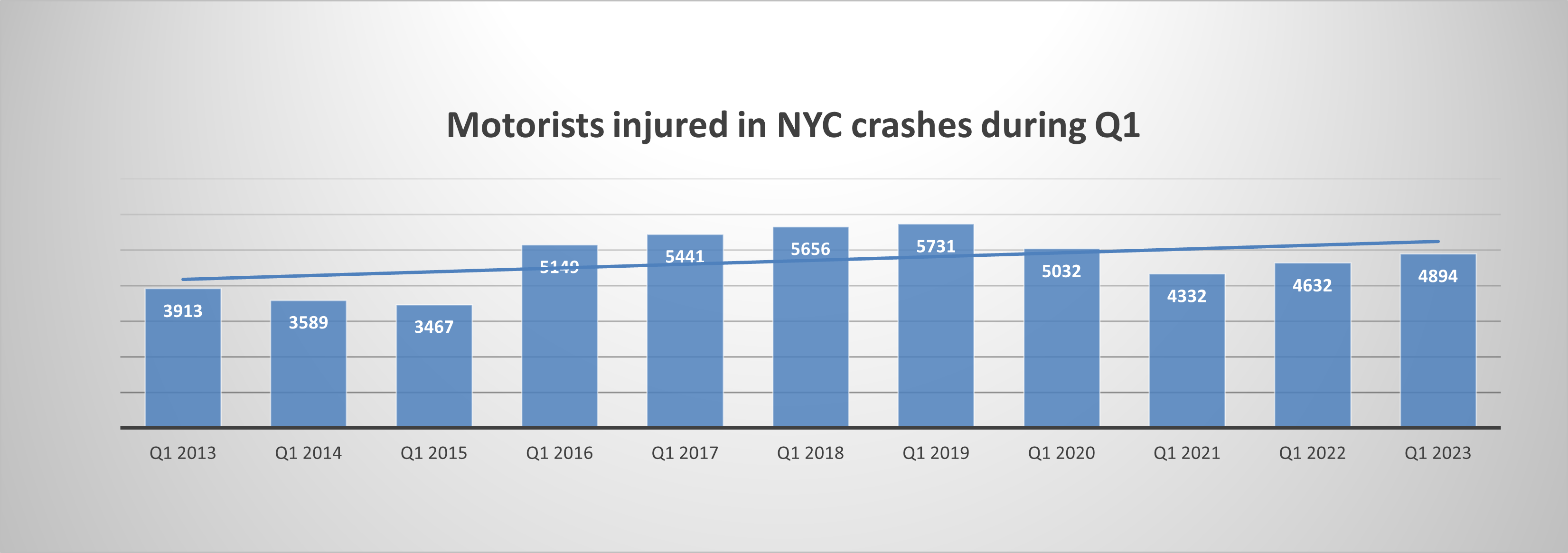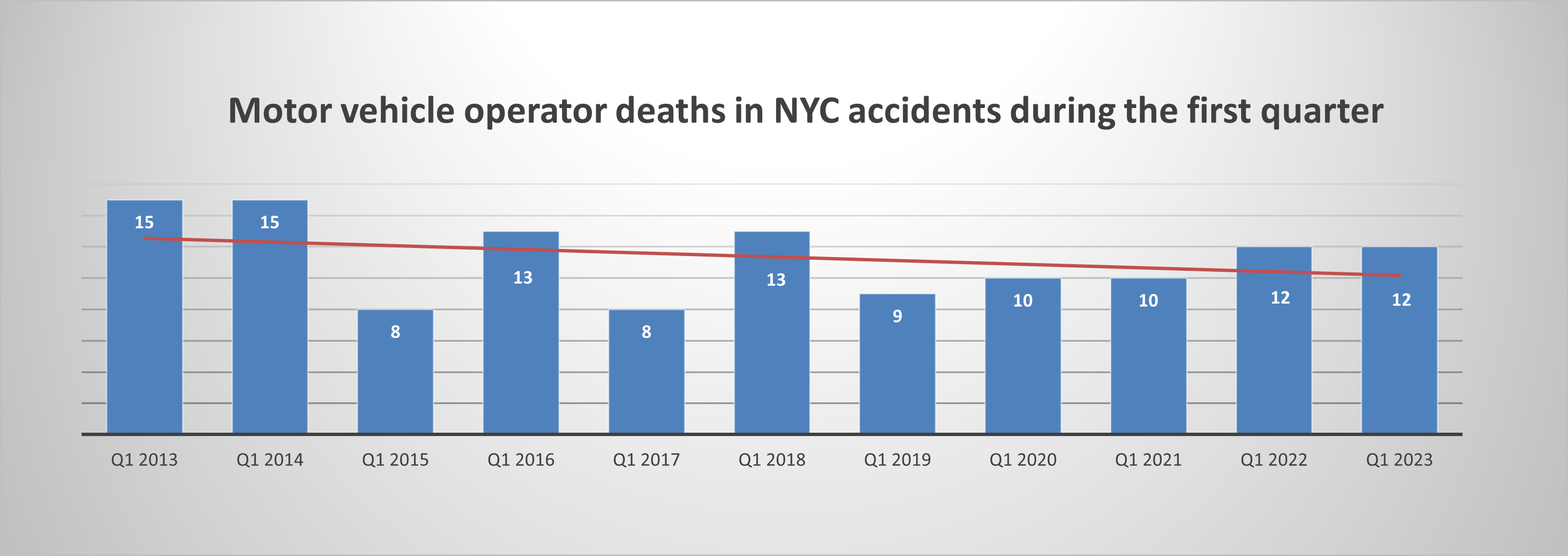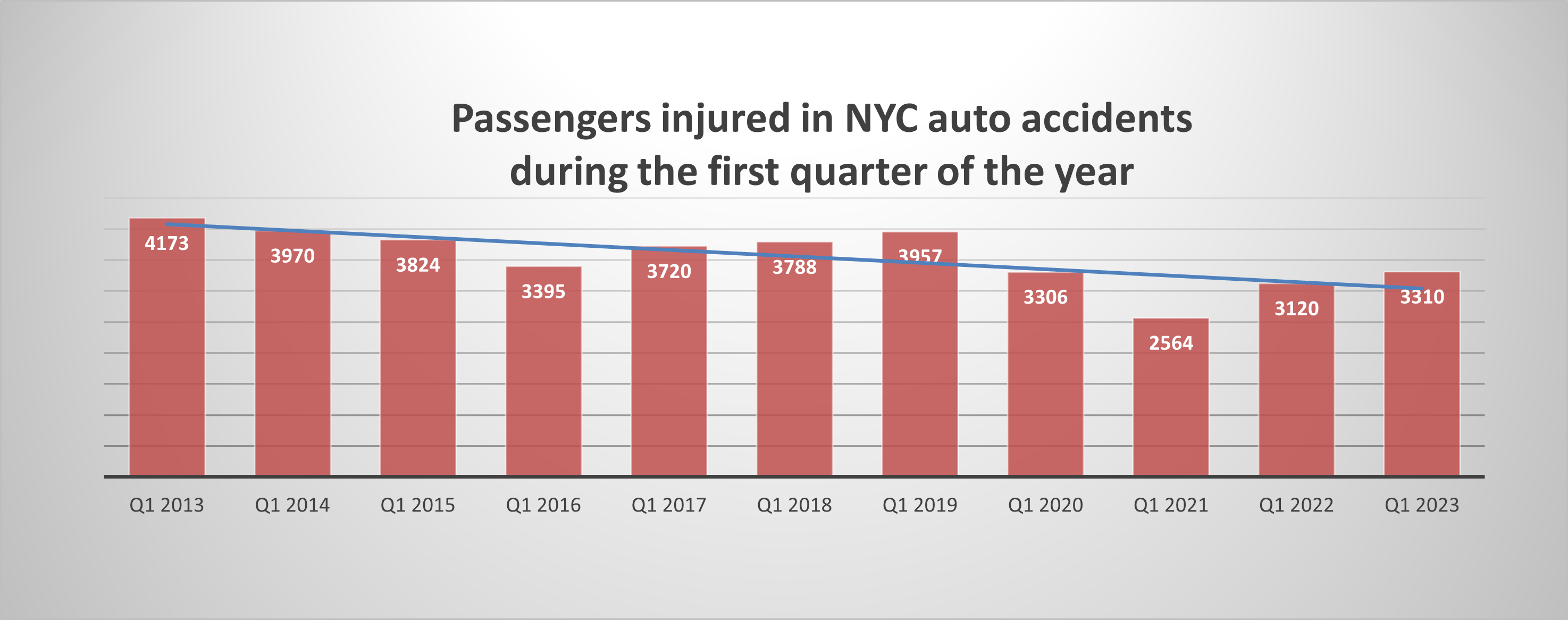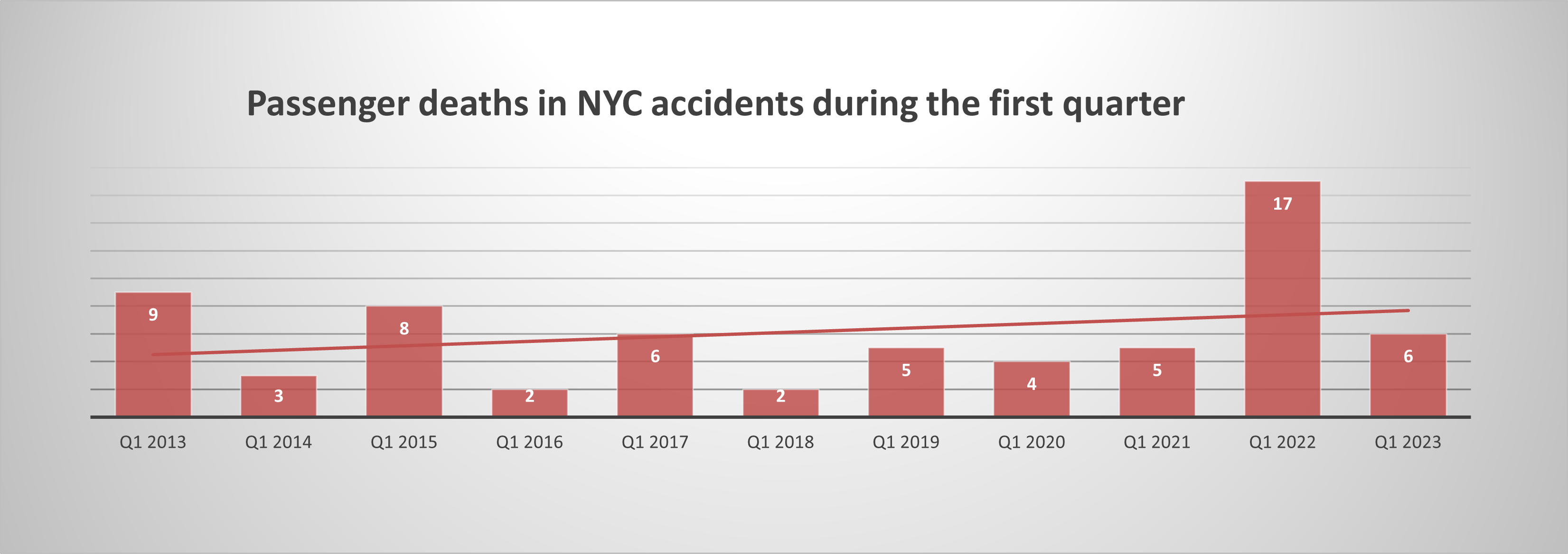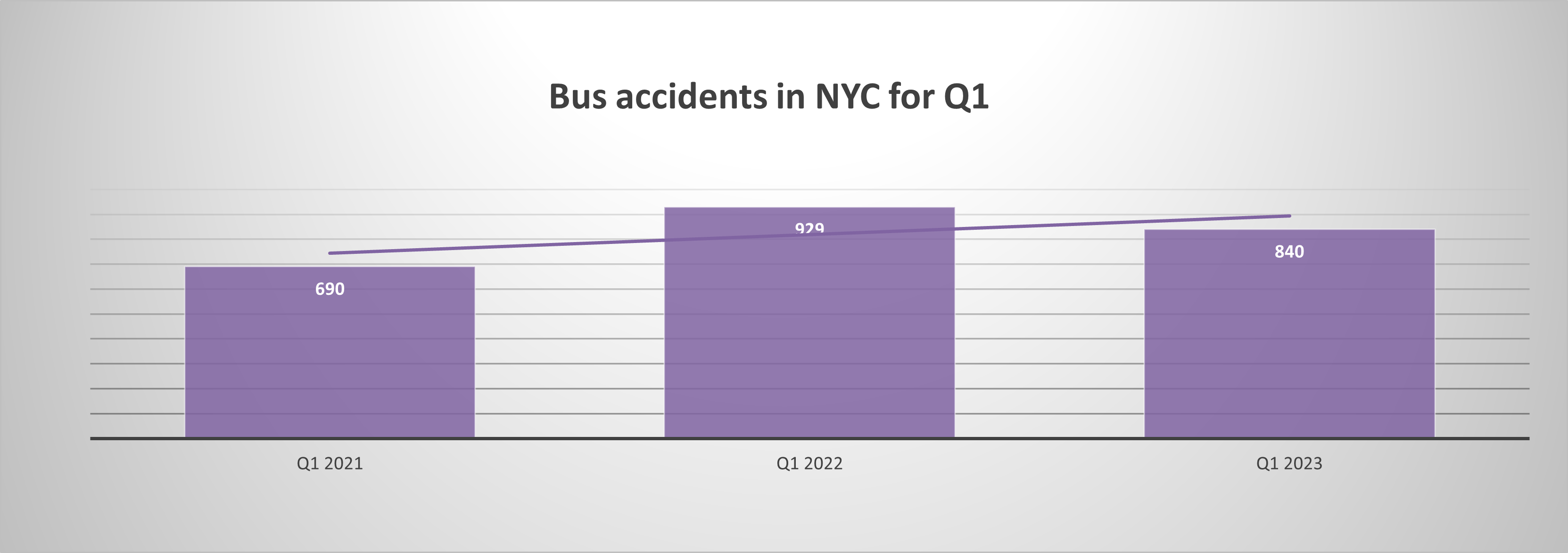NYC cyclist fatalities at record high during the first quarter of 2021
A total of 11,176 people were injured in NYC crashes during the first quarter of 2023 according to monthly statistics from the NYPD including 809 cyclists, 2,163 pedestrians, 3,310 passengers and 4,894 motorists. This is compared to 10,501, 8,984, 12,997, 12,920, 12,608, 11,936, 10,805, and 11,676 during Q1 of 2022, 2021, 2020, 2019, 2018, 2017, 2016, 2015, 2014 and 2013 respectively. The number of people injured in traffic accidents during Q1 of each year shows how injuries first declined after Vision Zero started in 2014 and 2015, compared to 2013, and then jumped again in 2016. The number gradually increased to pass 12,000 in 2017 and reach a record high of 12,997 in 2019 due to the increase in distracted driving accidents caused by cellphones and other electronic devices. Crash injuries dropped again in Q1 of 2020 and 2021 due to the decline in activity in the city caused by the pandemic, and gradually increased again in Q1 of 2022 and 2023 as the city gradually became more active again.
Since Vision Zero started in 2014, the number of people dying in car accidents during the first quarter of the year has never gone back to 69, the number of crash fatalities reached during Q1 2013. However, after Vision Zero started, traffic fatalities reached a record high at 58 during the first quarter of last year and remained high during the first quarter of this year with 47 fatalities.
While the number of passenger fatalities dropped significantly from 17 to 6, the number of bicyclist fatalities reached a record high during the first three months of the year. The warm winter, the increased popularity of e-bikes, as well as the more intense truck traffic generated by internet shoppers, are among the factors that contributed to this explosion of fatalities among cyclists.
Cyclists are the category of road users with the most concerning statistics, with both a record number of injuries and deaths during the first quarter of 2023. The number of cyclist injuries went above 800 during Q1 2023 for the first time with 809 cyclists injured. While using a bike or an e-bike to commute has reached an unprecedented level of popularity in New York, infrastructure improvements to make the streets safer for cyclists are lagging behind legal requirements of the 2019 Local Law 195, which requires the DOT to formulate a street safety 5-year master plan to improve street safety and implement it. The actual NYC Street plan requires the DOT to implement at least 250 miles of protected bike lanes by 2026, including 30 miles in 2022 and 50 miles in 2023. Last year, the Adams administration only reached 64% of the 30 miles required, and so far this year, only 8% of the required 50 miles of protected bike lanes have been implemented. Many injuries and probably some fatalities as well could have been prevented if the DOT was sticking to its objectives.
The explosion in bicycle accident deaths during the first quarter is the most preoccupying. Eight cyclists died in crashes between January 1st and March 31st, 2023, compared to 0, 1, 1, 6, 1, 2, 4, 1, 2, and 1 in Q1 of 2022, 2021, 2020, 2019, 2018, 2017, 2016, 2015, 2014 and 2013 respectively. Among those who died were:
- A 62-year-old woman riding a Citi Bike on an unprotected bike lane in Queens who was struck by a cement truck.
- A woman riding a Citi Bike on an unprotected bike lane in Brooklyn who was struck by a box truck.
- A man riding a bicycle in Staten Island who was killed by a reckless SUV driver.
- A 64-year-old man riding his bike who was killed by a speeding pickup truck in the Bronx.
Pedestrians remains the category of road users that suffers the most fatalities of all road users with 21 deaths for the first quarter of the year compared to 29 during the same period a year earlier. While this number remains high with on average 7 pedestrians dying monthly during the first 3 months of the year, it is a record low for Q1 compared to the 10 previous years. Vision Zero in New York City has contributed significantly to reducing pedestrian fatalities by implementing various measures such as:
- Lowering speed limits: The speed limit on most of New York City’s streets has been reduced from 30 mph to 25 mph, which has reduced the severity of crashes and given drivers more time to react to pedestrians and other road users.
- Redesigning streets: New York City has redesigned many of its streets to make them safer for pedestrians, including installing more protected bike lanes, creating more pedestrian plazas, and implementing safety improvements at intersections.
- Increasing enforcement: The New York City Police Department has increased its enforcement of traffic laws, particularly those related to speeding and failure to yield to pedestrians.
- Educating the public: Vision Zero in New York City has also involved extensive public education campaigns, including safety messages on public transportation and billboards, social media campaigns, and safety training programs for drivers, pedestrians, and cyclists.
Pedestrian injuries, while remaining on a downward trend, were higher during Q1 2023 than in the two previous years. After oscillating between 2,400 and 2,900 during the first quarters of most of the pre-Covid-19 Vision Zero era, pedestrian fatalities reached their lowest point during Q1 of 2021 as activity in the city was subdued. As borders opened again and New Yorkers started to go back to the office, activity increased and as a result, more pedestrians suffered injuries in crashes.
After dropping below 5,000 during Q1 2021, just after the Covid-19 crisis, the number of motorist injuries gradually increased again, reaching 4,894 during Q1 2023. Although still on a rising trend since Vision Zero started in 2014, injuries suffered by people operating a motor vehicle remain below 5,000, reflecting a city that is still less active than in 2019. Distracted driving has been identified as one of the top contributing factors to crashes resulting in injuries, and motorists who engage in distracted driving are more likely to be injured in a crash. Injuries from distracted driving accidents can range from minor cuts and bruises to more severe injuries, such as broken bones, spinal cord injuries, and traumatic brain injuries. It is important for motorists to focus on the road while driving and avoid distractions to prevent accidents and injuries. Additionally, laws and regulations have been established in New York State to discourage distracted driving, such as the ban on texting and driving.
During the first three months of this year, 12 motor vehicle operators died in crashes in New York City, compared to 12, 10, 10, 9, 13, 8, 13, 8, 15, and 15 during the same period in 2022, 2021, 2020, 2019, 2018, 2017, 2016, 2015, 2014, and 2013, respectively. Although the number of motorist deaths never returned to pre-Vision Zero levels since the beginning of 2014, the number of motorist fatalities recorded during the first quarters of the last two years is just one fatality away from the Vision Zero record fatality numbers seen in 2016 and 2018.
The number of motor vehicle passengers injured during Q1 follows a pattern similar to other road user categories, dropping during Q1 2021 and gradually increasing again during the first quarters of 2022 and 2023. While the number of injuries was back above 3,000 for Q1 2022 and Q1 2023, it was still lower than the number of injuries recorded during any first quarters of the pre-pandemic era.
After an unusually high number of 17 passenger fatalities during the first quarter of 2021, passenger deaths decreased to 6, a number which is more aligned with what it was in the past. This is an indication that last year was a sad exception. Since Vision Zero started, with the exception of Q1 2022, passenger fatalities have been oscillating between 2 and 8.
While looking at accidents per type of vehicle, it is interesting to note that the number of truck accidents in New York City was lower this first quarter that what it was during the first quarter of 2021 and 2022. 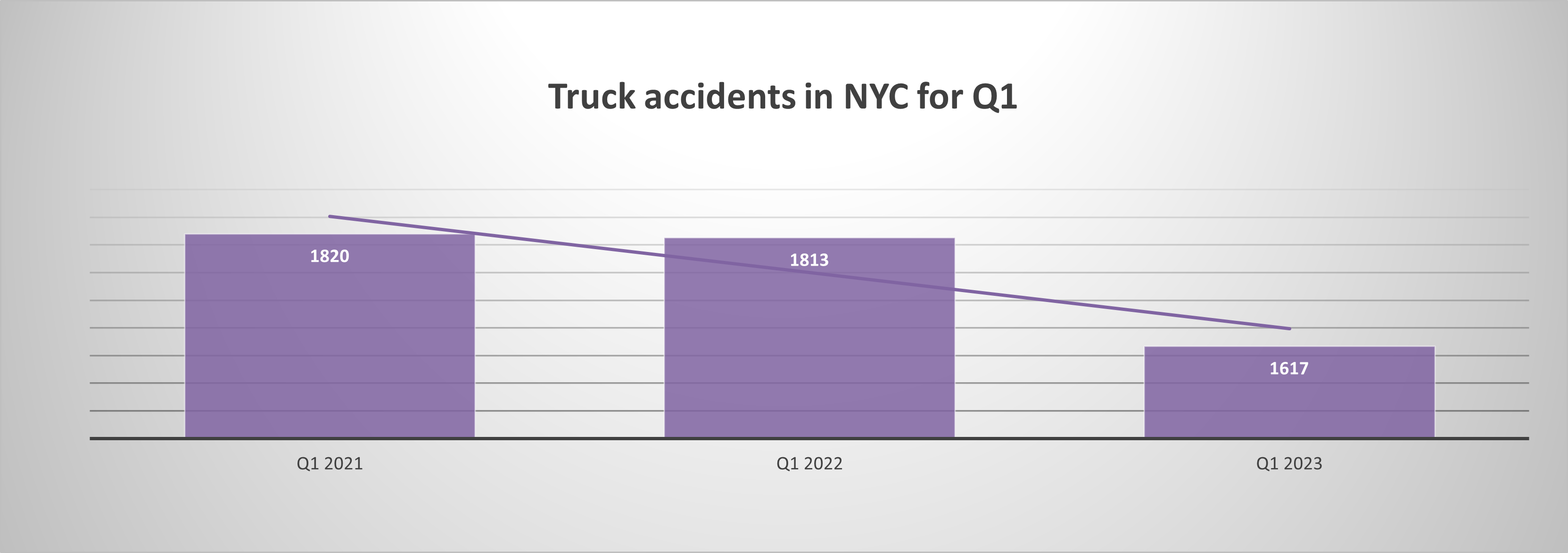
The number of bus accidents also decreased slightly this first quarter compared to the first quarter of 2022 but was not as low as what it was during the first quarter of 2021.
 New York Personal Injury Attorneys Blog
New York Personal Injury Attorneys Blog


